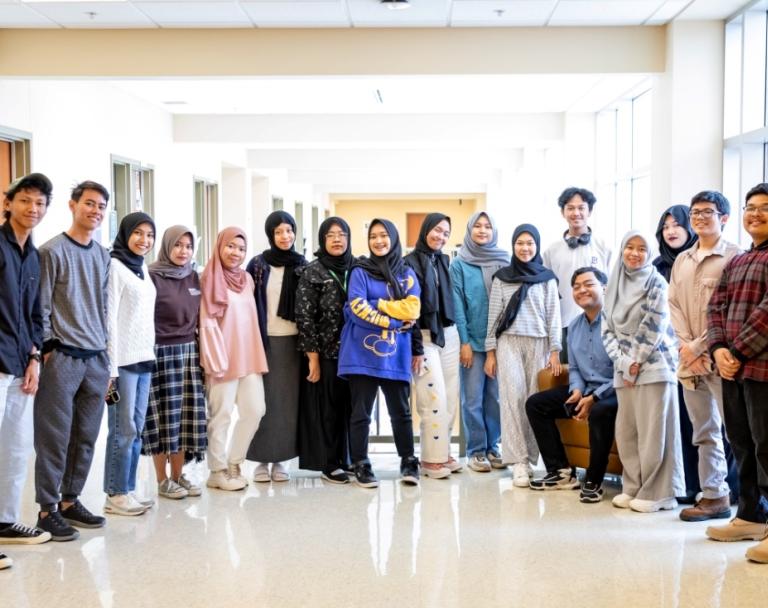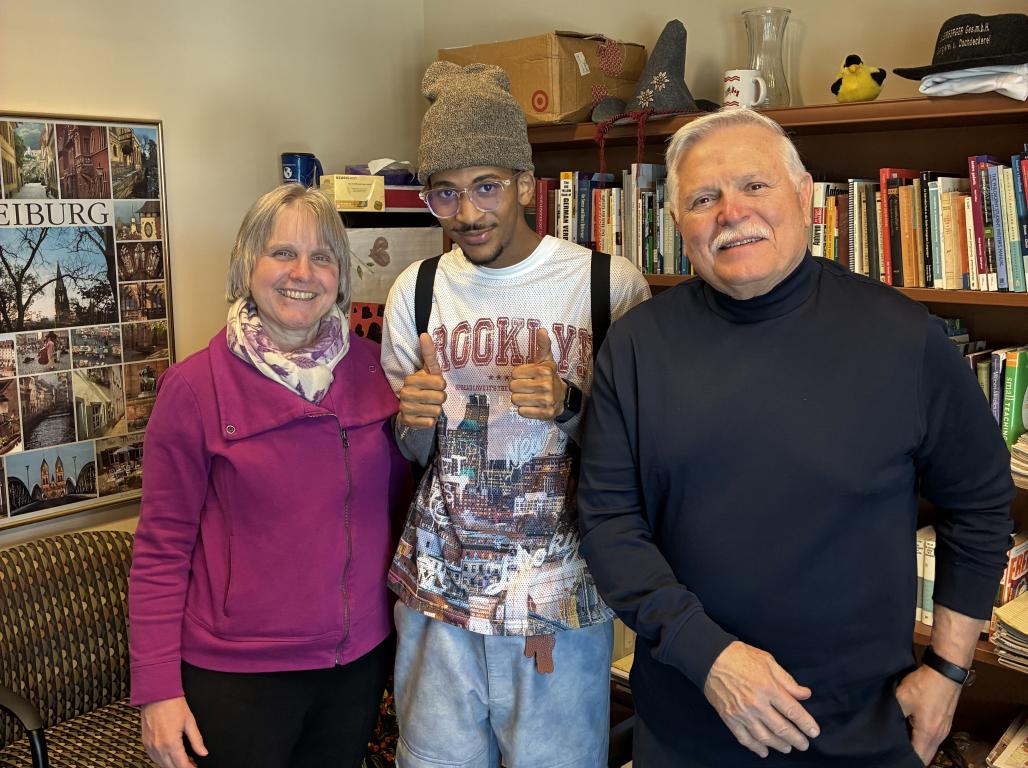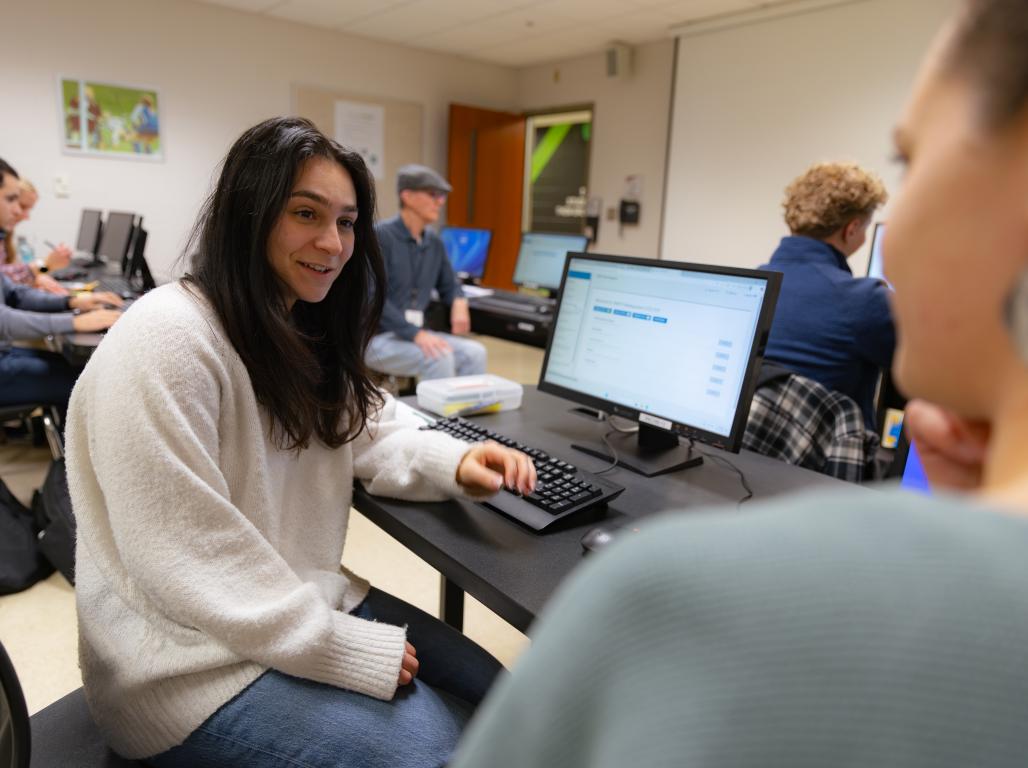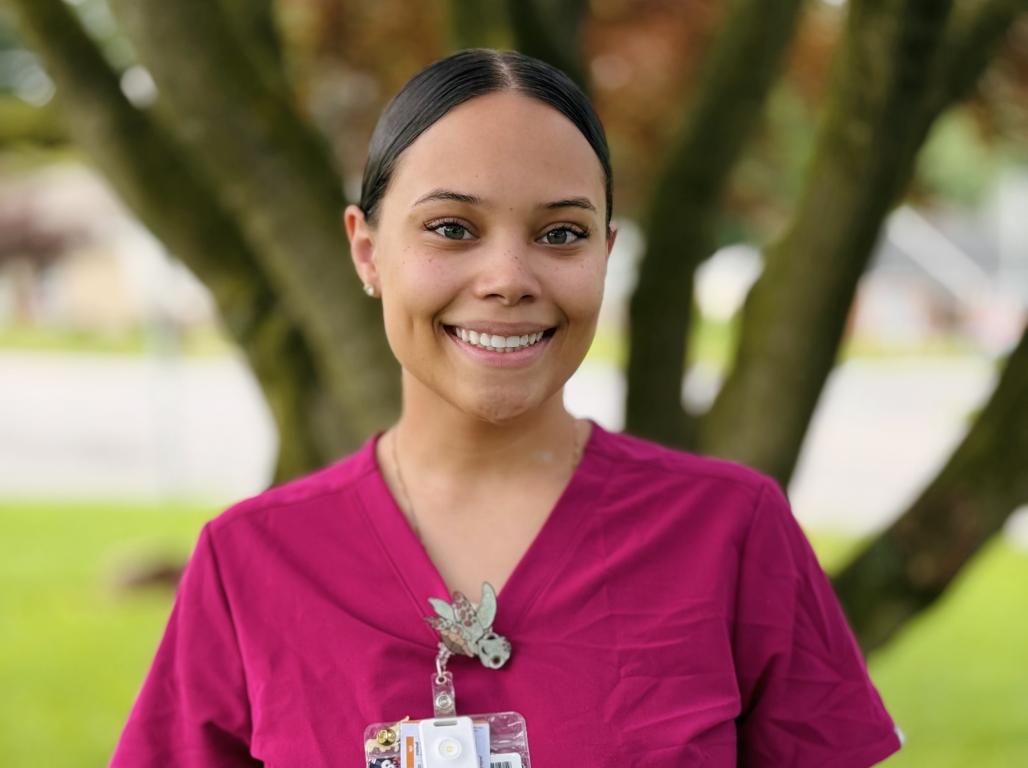The back wall of HUM 207 is bare except for a row of five or six small, framed photographs. In one, a large mushroom cloud billows over a desert landscape, empty except for a few tumbleweeds. In the image next to it, a Native American man in ceremonial dress stoically poses for the camera. Another is Dorothea Lange’s famous Depression-era photograph, “Migrant Mother,” taken in 1936. In it, Florence Owens Thompson, an indigenous farm worker, sits amongst her seven hungry children, her dark eyes squinting against the sun. For those who grew up studying 20th-century U.S. history, they’re recognizable images–snapshots of an America gone by.
The students in this particular class constitute a more modern snapshot of America. The class is made up entirely of students from Indonesia–17 of them–who have come to York College to study for the Fall 2023 semester. In the few minutes before class begins, the place is abuzz with conversation.
Everyone is talking, smiling, and laughing. Some converse in English, but most are speaking Indonesian. Santi Augustin ‘24 (Banyuwangi, East Java), an English Literature major, is seated at the head of one of the two long tables that run along either side of the classroom. She’s dressed casually, and wears a bright blue hijab (all of the women are wearing one) that covers her head and neck. She is showing the student across from her a photo on her cell phone, which prompts big laughs out of both of them.
Dr. Anne Greenawalt stands at the front of the classroom making final preparations before class begins. She teaches Interdisciplinary Communication to all of the Indonesian students twice a week. Looking through her notes, she seems unbothered by the amount of talking, which, apparently, is normal for this class. Dr. Greenawalt has plenty of experience working with international students. As a college student, she was a camp counselor in a summer ESL program. She also worked as a tutor at Penn State Harrisburg, where she mentored many international students on how to improve their writing.
“I’ve realized that there’s not much I do differently when working with international students,” says Dr. Greenawalt. “All students come to the classroom with different experiences and different abilities, and it’s my job to meet all students where they are and then help them to expand their skills.”
At 2 p.m., Dr. Greenawalt calls out over the din of laughter and conversation, and the students come to attention. Today, the class is discussing tools for conducting qualitative research, and, after a brief introduction, Dr. Greenawalt asks the students to pair up in order to conduct mock interviews, in which they ask their partner about their experiences thus far at York College.
Muhammad Raehan Zaky ‘24 (Sulawesi)–called Zaky by his friends and professors–is a Psychology major. He appears eager to talk about the differences between life in York, PA, and life back home. It's the smallest differences that stand out the most. “Just how we measure things is different,” he says. “Here we use miles, in Indonesia it’s kilometers.”
These 17 students have come to YCP from all over the Indonesian archipelago. They’re here as a result of a relationship that Christian DiGregorio, Director of International Recruitment, formed with The Ministry of Religious Affairs in Indonesia back in April 2023. “Usually, it's a couple years of courting,” says DiGregorio. “This happened quickly.” The Indonesian students arrived at York College just four months later, on August 20.
In his office, DiGregorio has surrounded himself with signs of world travel. Hanging on the wall behind his desk is a multicolored Kurdish sling meant for carrying a young child. To the left of his desk is a long table that is covered with trinkets and artifacts he’s picked up around the world: hand-painted Uzbek ceramics, Kazakh chocolate, and a metal packard in the shape of a mountain called a gunungan that was gifted to him by the Indonesian students as thanks for his work in bringing them to the United States.
When DiGregorio first took the position in March 2020, he immediately went to work on bringing students from other countries to YCP. “I was brought on board to help internationalize the campus,” he says, “and that process revolves around data.” In his search for countries with whom he could form relationships, DiGregorio came up with a list of twenty. “I whittled that down to twelve and then put out feelers to see who was responding. That whittled it down to five.” DiGregorio then began to “engage with those five countries to start developing relationships.” One of them was Indonesia.
“One of the key aspects of going to college is getting so many different perspectives from different people,” he said. “Not just from professors, but from the people sitting next to you in class. If that’s diverse, if programs like ours are successful, that adds to everyone’s education. There’s only so much you can get from a book,” says DiGregorio.
The cohort of Indonesian students come from universities throughout their home country. Their majors vary, but many of them are Political Science majors specializing in International Relations.
For Shafira Anggraeni ‘24 (Jayapura, Papua), majoring in International Relations naturally led to a desire to study in other countries. “I always wanted to study abroad, to see…and experience living in a very different culture from my own,” she says. “I always heard about how the U.S. has a very big role in the world, and can unofficially be said to be the ‘center of the world.’ ”
Muhammad Rafi Azizi ‘24 (Surabaya, East Java) is also studying International Relations. When explaining why he wanted to study abroad, he quotes J.R.R. Tolkien. “The world is not in your books and maps, it's out there,’ ” he says. “I want to learn new things, I want to see new things, meet new people. I wanted to make the boldest decision in my life, which was to step out of my comfort zone…and I did it.” Ahmad Nashrulloh ‘24 (Surabaya, East Java) chimes in: “I wanted to have a country tag on my Instagram profile,” he jokes. Then, seriously, “Studying abroad is going to open our window [to see] how wide the world is.”
Studying in a different country has presented some difficulties, though. There are the ones you would expect: speaking and studying in a non-native language, and the lack of a large Islamic community on campus (most, if not all, of the students are Muslim). But for the majority of the Indonesian students, the thing that is hardest to get used to has been the food.
“I can say that the food is the most difficult thing for me,” says Failusufa Azka ‘24 (Jakarta, Java). “I…love spicy food, and it is a bit hard to find. Indonesian food also uses spices which are quite different from most Western food.” Ahmad Nashrulloh ‘24 agrees, “In my opinion, the food here is nice, but sometimes it’s either too salty or too sweet for me.”
Santi gets especially excited when talking about food. “It’s one of the most difficult things to get used to,” she says. “I have a lot of favorite meals back home: Gado-gado (a dish common throughout Indonesia that consists of potato, rice cakes, and peanut sauce), rujak soto (a traditional Javanese salad), and bakso (Indonesian meatballs). I wish [everyone] could taste our traditional food. It’s so good…but the ingredients…are difficult to find here. I’m homesick about the food.”
Despite the adjustments the group seems to agree that the experience at YCP has been worthwhile, and they encourage other students to study abroad. “Studying abroad is such a life-changing experience,” says Failusufa. “You will learn that there are so many things outside your comfort zone to be explored.” Shafira agrees. “If you have a chance to do it, take it. Visit and learn from cultures all around the world, especially countries that are different from yours. Learn their struggle, immerse yourself in their culture and their world.”





